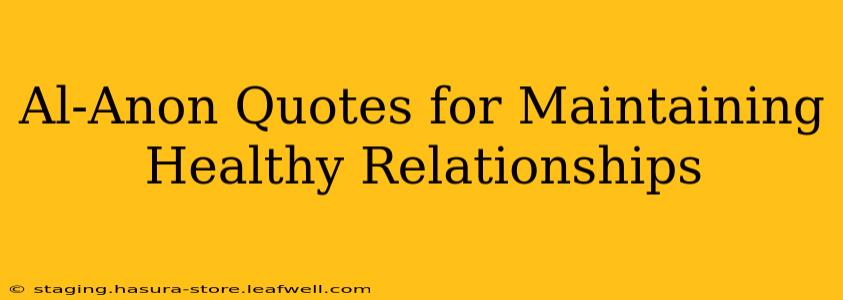Al-Anon Family Groups offer invaluable support and guidance for individuals affected by another person's drinking or addiction. While primarily focused on coping mechanisms and self-care, the principles learned within Al-Anon translate beautifully into maintaining healthy relationships of all kinds, even outside the context of addiction. This article explores powerful Al-Anon principles, expressed through insightful quotes, that can foster healthier, stronger connections with loved ones. We'll delve into how these principles can be applied to improve communication, manage expectations, and cultivate empathy in all your relationships.
What are Al-Anon's Core Principles?
Before exploring specific quotes, understanding Al-Anon's core principles is crucial. These include:
- Focusing on what you can control: Al-Anon emphasizes the importance of focusing your energy on yourself and your actions, rather than trying to control others' behavior.
- Self-care and prioritizing your well-being: Recognizing your own needs and boundaries is paramount to a healthy life and healthy relationships.
- Detaching with love: This doesn't mean abandoning loved ones, but rather setting healthy boundaries and allowing them to experience the consequences of their choices.
- Practicing acceptance and forgiveness: Embracing reality and letting go of resentment and anger are essential steps toward healing and growth.
- Honest self-reflection and personal growth: Continuous self-assessment helps to identify patterns and areas needing improvement in oneself.
Al-Anon Quotes and Their Application to Healthy Relationships
Here are several Al-Anon-inspired quotes and how they can be applied to building and maintaining healthy relationships:
"I can only control my own behavior."
This is a cornerstone of Al-Anon. In any relationship, applying this principle means focusing on your communication style, emotional responses, and personal actions. Instead of trying to change your partner or friends, focus on expressing your needs clearly, respectfully, and assertively. For example, instead of demanding someone change, try expressing your feelings: "I feel hurt when..."
"Living one day at a time."
This simple yet profound advice fosters a realistic approach to relationships. Instead of getting overwhelmed by long-term anxieties or past hurts, it encourages mindful engagement in the present moment. This helps prevent overreacting to minor issues and appreciate the present state of your relationships.
"Acceptance is not approval."
This vital distinction allows for healthy boundaries and prevents codependency. You can accept someone’s flaws, behaviors, or choices without necessarily approving of them. This leads to greater understanding and reduces the pressure to fix or control the other person.
"Let go of what you cannot change."
This speaks directly to the futile struggle of trying to force someone into being someone they're not. Accept people for who they are while still maintaining your own boundaries and self-respect. This doesn’t mean accepting abuse; it means accepting that you cannot force change upon someone else.
"The only person I can change is myself."
This quote highlights personal responsibility and self-improvement. Focusing on your personal growth and self-awareness helps you become a better partner, friend, or family member. It encourages introspection and taking ownership of your actions and their impact on relationships.
"Prayer is not asking, it's listening."
While rooted in spirituality, the principle of listening applies beautifully to relationships. Truly hearing your loved one, understanding their perspective, and responding empathetically fosters stronger connections. It emphasizes communication as a two-way street.
How Al-Anon Principles Enhance All Relationships
The principles outlined in Al-Anon are not limited to dealing with addiction. Their application across various relationships strengthens bonds, fosters mutual respect, and cultivates a healthier dynamic. By focusing on self-care, setting healthy boundaries, and practicing acceptance and forgiveness, you can create a more fulfilling and supportive environment in all your personal and professional connections. Remember, these principles are tools for growth, encouraging a more peaceful and loving approach to all your relationships.

